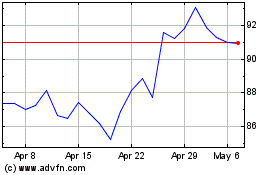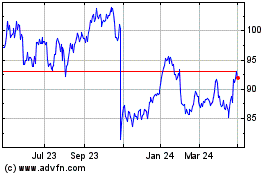Sanofi, Maker of World's Biggest Insulin, to Exit Diabetes Research
December 09 2019 - 5:13PM
Dow Jones News
By Denise Roland
The maker of the world's biggest-selling insulin has given up on
finding new diabetes drugs.
Sanofi SA, which makes Lantus, said Monday it would stop
investing in diabetes research after years of frustrated attempts
to bring a fresh blockbuster to the market.
The decision is part of a broader strategic overhaul by new
Chief Executive Paul Hudson, who hopes to reinvigorate growth at
the French health-care giant by focusing on fewer, more specialized
disease areas such as cancer -- mirroring a move being made across
the drug industry.
Diabetes for years was a lucrative business for Sanofi but has
more recently become a problem child. Uproar from patients about
the price of insulin, and tough actions from insurers and
pharmacy-benefit managers, has hurt revenue from the lifesaving
drug in recent years. At the same time, a government investigation
into insulin prices is under way, piling on more pressure
still.
Sanofi's top rivals in diabetes, Novo Nordisk A/S and Eli Lilly
& Co., have responded to those pressures by investing heavily
in new classes of diabetes medicine. But Sanofi's attempts to do so
have flopped. The most advanced treatment in its pipeline, a new
type of sugar-lowering drug, trails far behind competitors, and Mr.
Hudson said Sanofi would no longer launch the product because of
the heavy investment required to catch up.
Sanofi also will end research into cardiovascular diseases,
another area it has found challenging of late, with sales of its
Praluent drug disappointing amid concerns over price.
"To be out of cardiovascular and diabetes is not easy for a
company like ours with an incredibly proud history," Mr. Hudson
said on a call with reporters. "As tough a choice as that is, we're
making that choice."
Sanofi is one of the most diversified companies in the industry,
spanning branded prescription drugs, vaccines and over-the-counter
treatments. Within branded drugs, it produces medicines ranging
from insulin to specialty medicines for rare diseases.
Mr. Hudson, a former Novartis AG executive who became Sanofi's
CEO in September, is now setting about undoing some of that.
Instead, Sanofi will focus its efforts on a range of specialty
diseases -- including hemophilia, breast cancer and multiple
sclerosis -- and vaccines. Mr. Hudson highlighted Dupixent, an
injected treatment for eczema and asthma that he said "has the
chance to be one of the most successful medicines in the history of
the industry."
Sanofi on Monday set a target to eventually hit EUR10 billion
($11 billion) in annual sales for Dupixent. The drug is on track to
generate around EUR2 billion in 2019.
Sanofi also plans to separate its over-the-counter medicines
business, which makes nonprescription treatments for common
ailments such as colds and indigestion, into a stand-alone unit.
The move, said Mr. Hudson, would give the unit more freedom to
operate.
Mr. Hudson also unveiled plans to cut EUR2 billion in costs by
2022, and an aim to improve Sanofi's business operating income -- a
measure of operating income that strips out certain one-time items
-- to 32% by 2025, up from 25.8% last year.
Sanofi signaled its interest in oncology earlier Monday, when it
announced the $2.5 billion acquisition of biotech Synthorx Inc., a
deal that will boost its pipeline of cancer immunotherapies, or
drugs that help the immune system fight tumors. Sanofi has a long
history in cancer but has fallen behind in the latest rush to
develop immunotherapies.
The break from diabetes will herald a new era for Sanofi:
Diabetes has been a key pillar for Sanofi since its formation in
2004 with the merger of Aventis and Sanofi-Synthelabo. Aventis had
four years earlier launched Lantus, which by the time of the merger
was already the most widely prescribed insulin in the U.S.
Insulin is an old drug, used to treat diabetes since the 1920s.
But Lantus represented a big leap forward in terms of convenience.
It helps diabetes patients with the difficult task of managing
their blood sugar between meals and overnight with just one
injection a day.
Sanofi's diabetes franchise has been declining for several years
amid intense pricing pressure in the U.S. and the launch of a
lower-cost competitor. Despite that, Lantus is still Sanofi's
biggest-selling product. Sanofi plans to hold on to the existing
franchise.
Still, its decision to pivot away from diabetes, as well as
cardiovascular medicine, toward specialty diseases is common in the
industry.
Drugs for broad disease areas including heart disease and
diabetes require large, expensive clinical trials and come up
against more pricing pressure because of the sheer number of
potential patients.
Drugs for specialty diseases, on the other hand, require smaller
trials and can command higher prices. Cancer especially is
attracting heavy investment from the industry because of a run of
recent scientific breakthroughs, a permissive regulatory system
that allows for smaller and faster clinical trials and the ability
to charge higher prices.
Write to Denise Roland at Denise.Roland@wsj.com
(END) Dow Jones Newswires
December 09, 2019 16:58 ET (21:58 GMT)
Copyright (c) 2019 Dow Jones & Company, Inc.
Sanofi (EU:SAN)
Historical Stock Chart
From Mar 2024 to Apr 2024

Sanofi (EU:SAN)
Historical Stock Chart
From Apr 2023 to Apr 2024
